
How to Build Strong Relationships with Wholesalers
Suppliers are the foundation of any business, whether you’re a traditional retailer or a dropshipper. That’s why cultivating and maintaining a healthy supplier relationship is crucial for your business to flourish. Supplier relationship management involves identifying, selecting, and managing suppliers. It's a complex and time-consuming process that requires strategic planning and ongoing effort. But, prioritising supplier relationship management for your business can help you better understand your wholesale suppliers, establish good relationships with them, get better prices, improve supply chain management, and help maintain a competitive edge. So how do you build relationships with wholesalers? Read on and hear what the experts at Dropshipzone have to say.
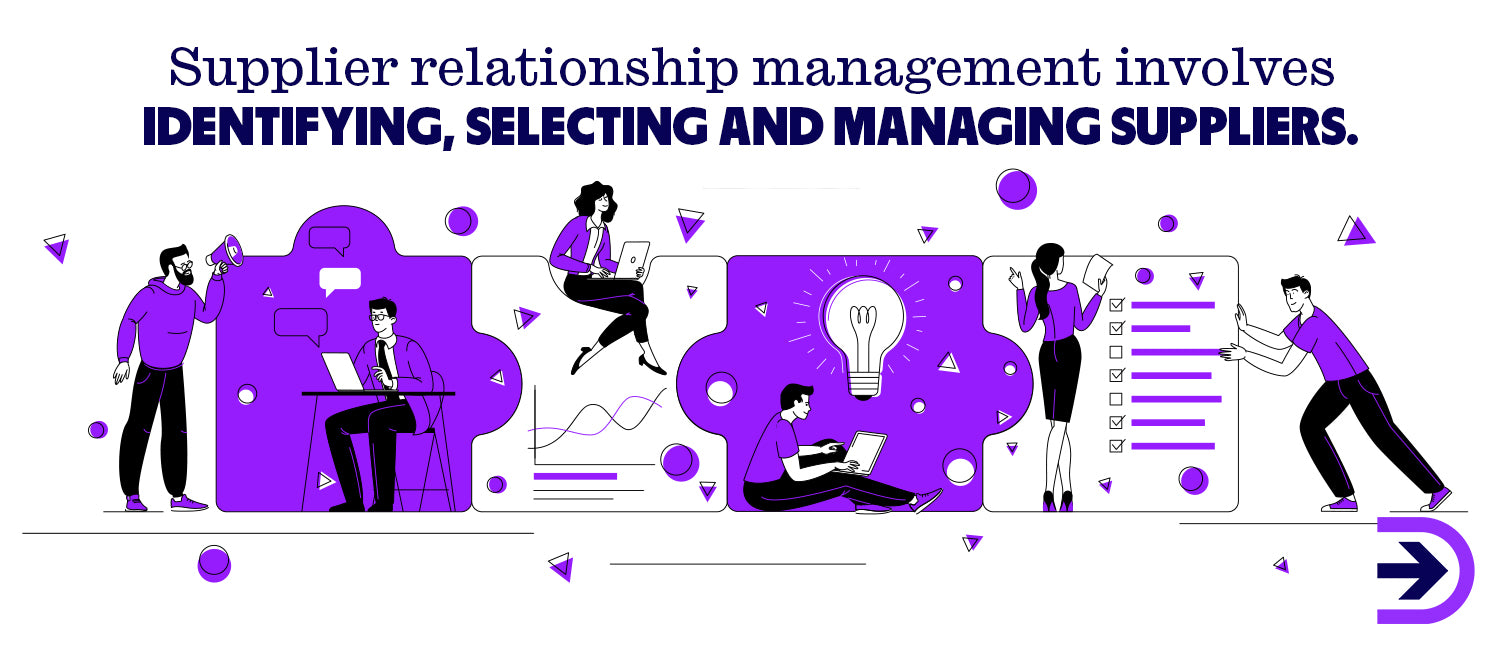
How Do You Start a Relationship With a Supplier?
Step 1: Determine the Product You Wish to Sell
There are many factors to consider when choosing a product for dropshipping. Start off by brainstorming ideas to find the best products to sell. Then, identify an ideal target market and conduct market research. Create a customer persona to visually represent your audience. Research tools like Google Trends are an effective means of finding trending products and categories. Finally, narrow down your selection by looking at product prices, shipment criteria and your competitor’s products. Once you’ve chosen your ideal trending product, it’s time to look for a supplier.
Step 2: Research Potential Suppliers
When looking for suppliers for dropshipping, you’ll come across three key players in the supply chain. Suppliers obtain products directly from manufacturers that go to wholesalers, distributors and dropshippers. Wholesalers purchase goods in bulk from suppliers and resell them to dropshippers and other retailers. Distributors act as middlemen between suppliers and wholesalers, but they can also directly sell products to customers. For more information on the difference between wholesalers, distributors and suppliers, visit our blog Wholesaler vs. Distributor vs. Supplier: What’s the Difference?
One of the ways to find reliable dropshipping wholesale suppliers is to perform an advanced Google search. This will provide you with a list of potential suppliers. Make sure you do your due diligence to identify and understand the credibility and suitability of a prospective supplier. It will also help you choose the right supplier for your business and detect risks associated with potential suppliers. The following are some of the red flags that you should look at to identify a fraudulent wholesale supplier:
-
They retail to the general public, not solely B2B.
-
They charge ongoing or hidden fees to access their products.
-
They have a history of making mistakes with orders.
-
They have negative or few reviews.
You may directly speak to manufacturers or distributors to find legitimate suppliers, or consider joining a wholesale supplier directory by paying a one-time joining fee or signing up for an ongoing subscription. You may conduct research to understand your competitors' business and know their suppliers. You can also attend events sponsored by or featuring potential suppliers such as conferences and expos. With the right networking opportunities, you can start developing key supplier relationships before you've even made a formal offer.
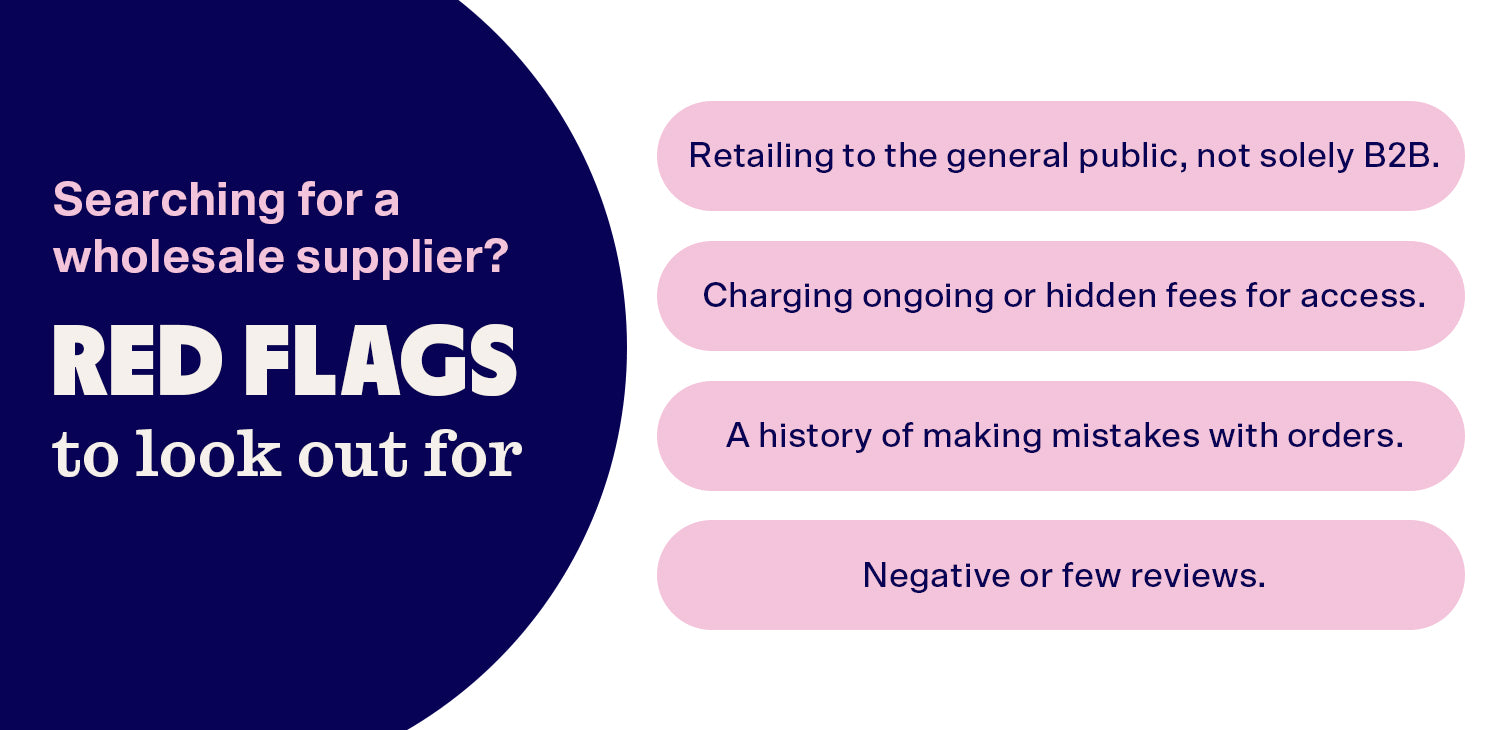
Step 3: Contact Potential Suppliers & Introduce Yourself
A supplier gets so many messages on a daily basis, it's a feat even if they open your message. Your first impression can make or break new business relationships. Introduce yourself to the shortlisted suppliers who you will be working with. A pro tip, don’t just contact the suppliers over the phone or email. Try to meet your prospective suppliers in person. If you can’t meet them in person, schedule a meeting over Facetime or Zoom. Studies such as this Harvard Business Review have shown that in-person interactions are essential to developing successful long-term business relationships as they provide important information about our future business partners, from their tone of voice to their body language. Professionalism is key to a good relationship. Show your selected suppliers you are a genuine professional from the beginning, and you’ll find it easy to gain their confidence and trust. Don’t forget - they need your business as much as you need theirs, so don’t hesitate to negotiate a better deal.
Why is it Important to Keep Good Relationships with Wholesale Suppliers?
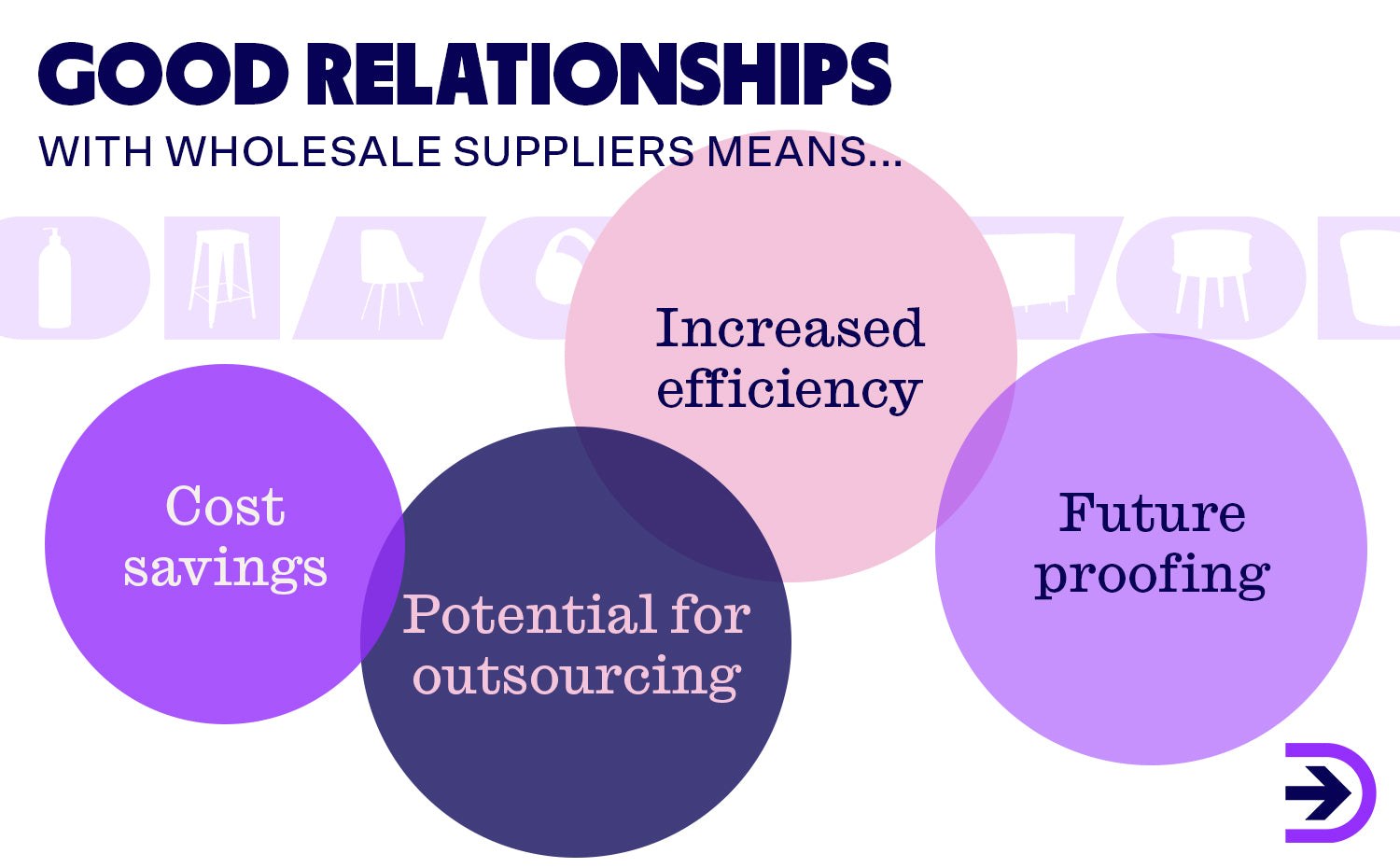
Cost savings
When you have a great supplier relationship, you’re more likely to gain access to exclusive deals, the first look at new products, iron-clad long-term contracts and other cost-cutting opportunities. If your supplier enjoys their working relationship with you, trusts your methods and benefits from your business, they will want to go out of their way to keep you in business with them. Remember, they need your business too, and it may cost them more money to find new retailers than simply offering you a discounted rate.
Increased efficiency
The B2B industry is complex. Building a healthy relationship with your supplier can help improve the efficiency of your business. Keep your communication channels with your suppliers clear so you’ll know if there are any shipping delays, product recalls or other supply chain issues. Better supply chains lead to higher customer satisfaction. Strategise together to ensure you’re working at maximum efficiency. Share resources that will improve both of your businesses.
Potential for outsourcing
Great supplier relationships can provide much-needed support and encourage your business to come your way. Your supplier will understand your business and meet your business needs more effectively. A supplier might be able to identify any gaps in your supply chain and help you develop an efficient system for your business to grow and provide ultimate customer satisfaction. In some cases, your supplier might also take over some of your business activities, such as managing inventory levels and some elements of customer service.
Future proof your business
Maintaining good relationships with suppliers in the retail industry will help you build a good reputation for being a great business partner to engage with. If you ever want to change suppliers, this reputation will help lay the foundation for your new supplier relationship. Without a positive working relationship, your suppliers might hesitate to work with you, and you may have to spend your precious time looking for new suppliers.
Tips For Building a Great Supplier Relationship with Wholesalers
1. Keep in Touch with Your Supplier
Consistent communication is one of the most important aspects of maintaining great supplier relationships. Not only should you be in regular contact with your key suppliers, but you should work on building healthy relationships outside the transactional by getting to know them and developing a friendly rapport to make yourself stand out from the crowd. Share business milestones, personal victories, learnings about your industries, and constructive feedback. Don't be one of their mere vendors, but go the extra mile to be their best customers and dear friends. For effective communication tips for businesses, check out this guide from the Queensland Government.
2. Always Pay on or Ahead of Time
Nobody appreciates a tardy paycheck. Make sure you are paying on time. Don’t force them to chase you up if something goes wrong - reach out to them as soon as possible to offer apologies and a potential solution. Better still, pay suppliers ahead of time. This will reflect your professionalism. Some suppliers track their retailers’ payment history and offer better prices and terms to those who pay on time. Always keep your promises, and you’ll earn their respect, no matter how big your business is.
3. Be Patient & Flexible With Your Wholesale Supplier
The fulfilment process can be easily disrupted by local and global issues. When issues arise, it is crucial you show a little patience and understanding, especially if this is a one-time problem. Your dropshipping agreement should include contingencies for these circumstances. If it’s a recurring issue with your supplier or they’re not meeting contractual obligations, then you should consider renegotiating the terms of your agreement or dropping them as a supplier.
4. Give Constructive Feedback to Your Supplier
Don’t be afraid to provide feedback to your supplier about their performance during your regular communication. Rather than diminishing your relationship, giving constructive feedback can help build strong supplier relationships and aid in future transactions. It’s important that the feedback you give is clear, honest and backed by data. Don’t just focus on the negatives but highlight your supplier’s strengths. Always come prepared and ready to answer questions and provide clarifications. It’s important to remember that the feedback process is a two-way street, and you should ask suppliers for feedback where possible.
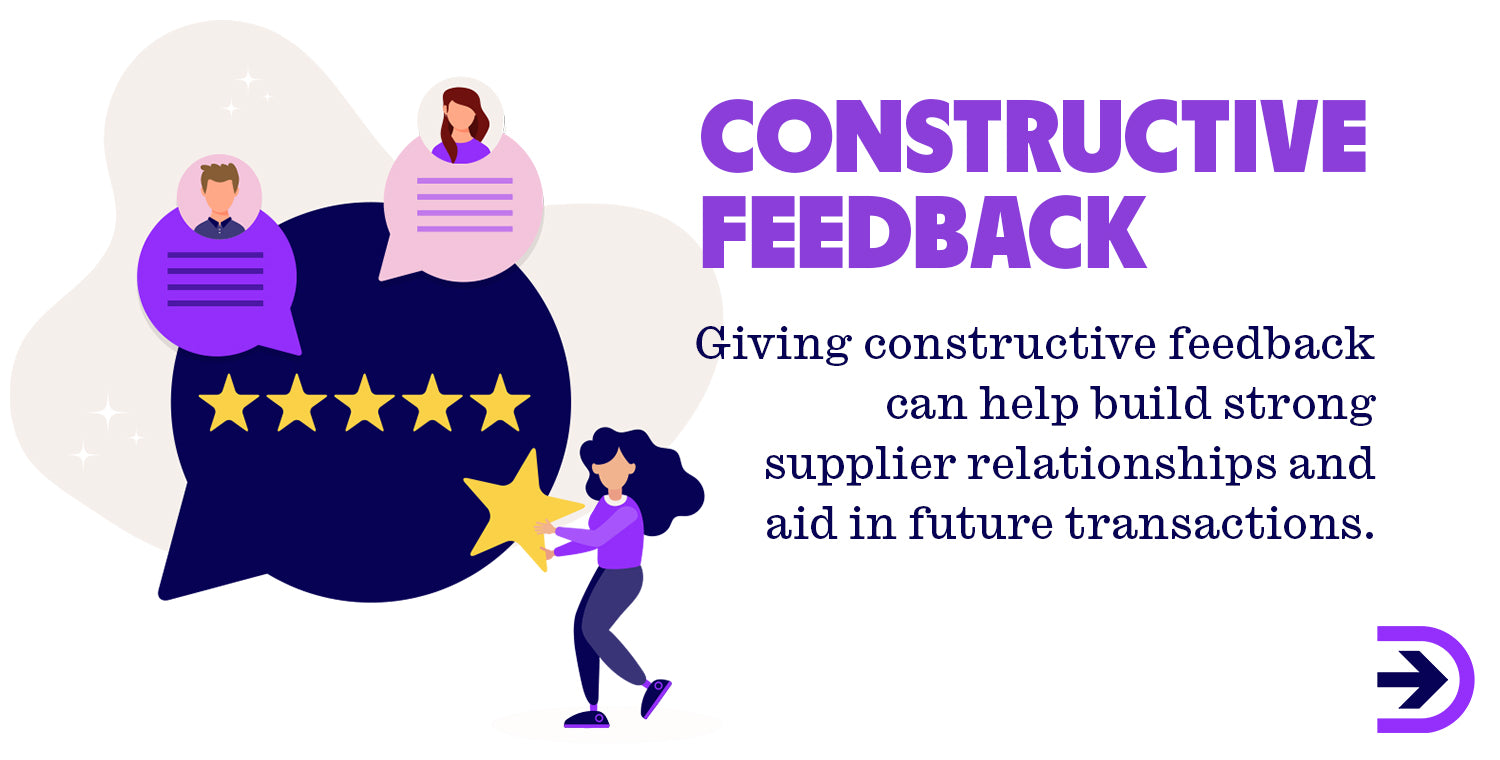
5. Show Appreciation to Your Supplier
Make sure your suppliers feel you care about their business. Do something nice for your supplier, and you might see your goodwill return in the form of deals and discounts further down the track. Celebrate your supplier’s milestones, attend their meetings, parties and company events, and invite them to yours. Not only will you get additional insights into their business, but it shows that you are eager to be involved in your partnership.
6. Remain Loyal to Your Supplier
With dropshipping, the concept of supplier loyalty can feel a little murky. Not only are you likely to use multiple suppliers, but you may also use a competing supplier to get the same product in case of delays or sold-out stock. However, there are many ways to be loyal to your existing suppliers. Offer large deposits when making orders. Give them repeat business and recommend them to other retailers. Don’t just pay on time, be prompt with your communications and attend their meetings.
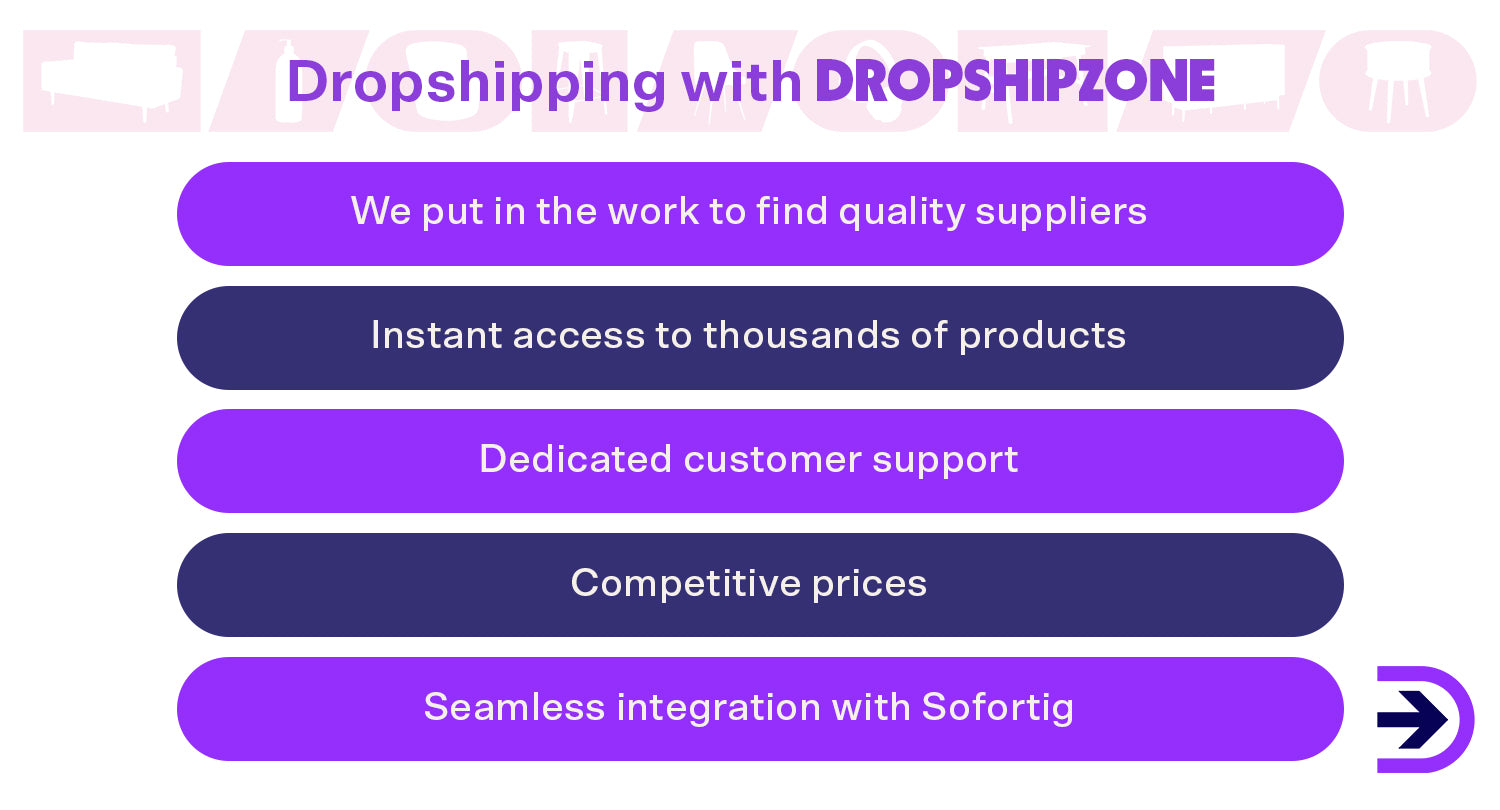
At Dropshipzone, we put in the work to find quality suppliers, so you don’t have to. Join for free today and get instant access to thousands of products from suppliers that care. You also get a dedicated customer support team, competitive prices and integration with Shopify and other channels through Sofortig and API integration. With new Australian suppliers joining every day, starting your own online business with Dropshipzone has never been easier.

